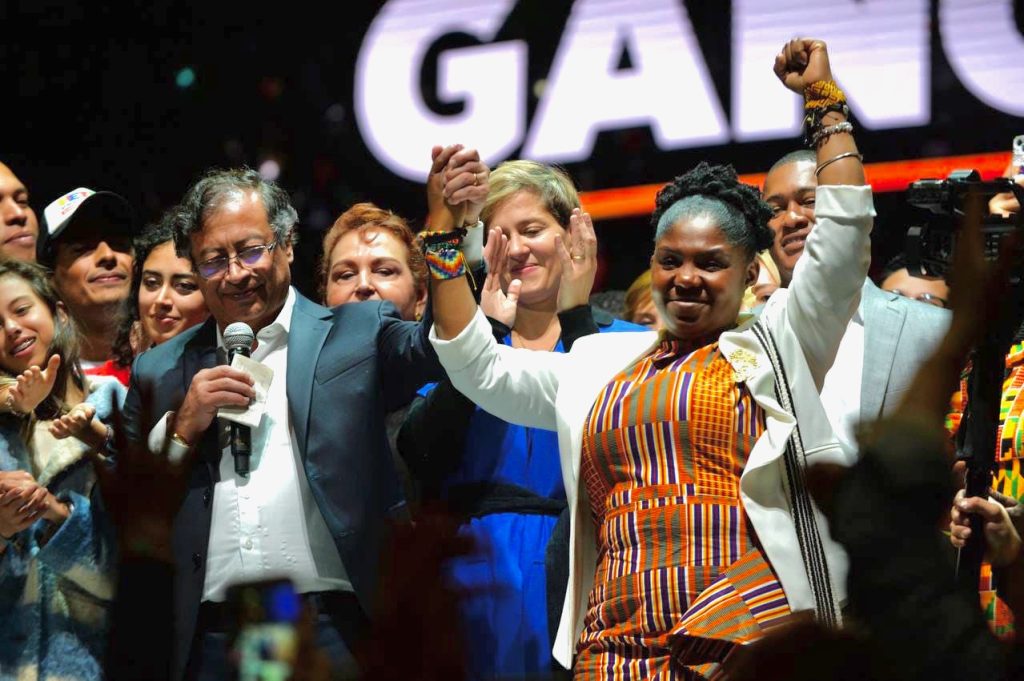In her article reflecting on the Colombian elections, Begüm Zorlu, PHD researcher at City, University of London argues that the Petro and Márquez leadership’s focus on a green agenda and social forgiveness can bring back the implementation of the peace process that has been hampered in practice due to political violence.

We will remember the last few months as a momentous period in Colombian history. Gustavo Petro, is now the first candidate from the left to become the president of the country. His election was especially a milestone, as his political origins was shaped by his membership to the 19th of April Movement, which later became a political party. Petro won the elections with the coalition, the Historic Pact, which brought together progressive parties. The group was supported by young people, women, ethnic minorities, trade unions and the pro-peace movement.
The election of Petro, along with his vice-president Francia Márquez has raised the optimism to return to the peace deal with the FARC that was signed in 2016. The peace deal, which has been praised by the international community, has set a process of hope which was shattered by the spiral of violence that has been going on in its aftermath. The peace deal in theory was seen as one of the most progressive agreements in the history of peace accords, as it focused on the rights of victims and promoted a gendered understanding of peace. However, with the election of the right-wing president Iván Duque, increasing violence and scepticism towards the implementation of the deal, a pessimistic mood emerged. Only in 2021, around 150 social leaders were killed, including human rights activists, community leaders and environmental activists.
Petro’s campaign challenged this pessimistic mood to propose an alternative path, which shaped his increasing rise to the power. By focusing on a positive message, on a more dignified life for Colombians, the campaign underlined a message of hope. I believe that the two aspects of Petro’s campaigns makes it plausible that his administration will implement the peace process and provide a more open context for societal peace to emerge in the country. This is because the campaign’s focus on social forgiveness and the conformity of his climate policies with the general outlook for peace pave the way for this process to prosper.
A Focus on Climate Change
Petro’s selection of Francia Márquez was not a coincidence. Petro ran his campaign with Márquez, a renowned environmental activist who has continued to continue her pro-climate mission in spite of the threats to her life. They again made history as she became the first black women to be Colombia’s vice president. Marquez gained attention of progressive forces with her march of 80 women to bring attention to the impact that illegal gold mining was having in those rural communities. She has received the prestigious Goldman Environmental Prize a couple of years ago.
This administration’s critical move has been to pledge the reduction on oil extraction by aiming to replace it with “agriculture, manufactured goods, tourism, and clean energy.” By arguing to lead a process to “undertake a gradual de-escalation of economic dependence on oil and coal” the administration stated that they will not “grant any new licenses for hydrocarbon exploration” and “halt all pilot fracking projects and the development of offshore fossil fuels.” What stands out in this proposal is the promotion of projects to fights against climate change like those focusing on solar energy. As Joe Lo argues in his essay, this can lead to further protection of environmental activists and empowerment of communities, which will pave the way for inclusion and societal peace. This is because firstly some of the proposals aim for a “mixed ownership arrangements with indigenous communities”, coal mining workers and local councils.”
Secondly, climate activists that endanger the interests of private-stakeholders have been frequently under attack. These new changes signal the path to change the status quo towards the normalisation of violence against activists. Likewise, the selection of Marquez that underlines the importance of the struggle of social leaders that have been targeted and provides a symbolic significance. Her quote demonstrates this perspective: “I come from a historically forgotten town and region. My task is to guarantee rights to those excluded and marginalized territories, guarantee rights to Afro-descendant and indigenous populations.”
Social Forgiveness
Furthermore, Petro emphasised the role of social forgiveness in his campaign, recently defining it as “an expression of society in search of reconciliation.” He has been theorising and seeking proposals for resolution to the never ending spiral of conflict for more than 20 years. In his understanding of the concept, Petro brings forgiveness and reconciliation together, yet furthermore adds that “there must be certain “historical conditions,” based on a prior process of “truth and reparation for the victims, through specific mechanisms.” In his recent speeches he underlines the role of law leading the process of reconciliation. This marks a shift from the previous administration’s policies that either aimed to eliminate the conflict only via violence, without taking the societal demands into account, or not going sufficiently in-depth to address the dynamics of reconciliation and trust.
The Way Ahead
With the focus on social forgiveness and a just climate policy, there is a lot of optimism for peace to take root in Colombia. After Petro’s victory, the ELN guerrilla group stated that they wanted to resume peace talks. This demonstrates that this administration has a lot of potential to finally adapt not only sign the peace deal. Those who are researching peace will be watching the developments in Colombia.

